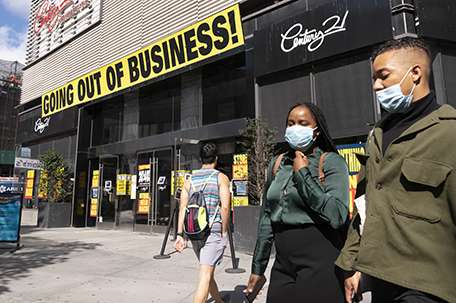
ABOVE PHOTO: People wearing masks walk by Century 21 department store, Wednesday, Sept. 30, 2020 in the Brooklyn borough of New York. (AP Photo/Mark Lennihan)
By Martin Crutsinger
ASSOCIATED PRESS
WASHINGTON — The resurgence of coronavirus cases engulfing the United States and Europe is imperiling economic recoveries on both sides of the Atlantic as millions of individuals and businesses face the prospect of having to hunker down once again. Growing fear of an economic reversal coincided with a report Thursday that the U.S. economy grew at a record 33.1% annual rate in the July-September quarter. Even with that surge, the world’s largest economy has yet to fully rebound from its plunge in spring when the virus first erupted. And now the economy is slowing just as new confirmed viral cases accelerate and rescue aid from Washington has dried up.
If many consumers and companies choose — or are forced — to retrench again in response to the virus as they did in the spring, the pullback in spending and hiring could derail economic growth. Already, in the United and Europe, some governments are re-imposing restrictions to help stem the spread of the virus.
In Chicago, where Gov. J.B. Pritzker of Illinois has banned indoor dining and drinking, Grant DePorter, who runs Harry Caray’s Restaurant Group, worries that the blow to restaurants and their employees could be severe.
When indoor dining was first shut down in the spring, he noted, employees could get by thanks to a $600-a-week federal unemployment benefit. That benefit has expired.
“Everyone is incredibly disappointed by the state’s decision,” DePorter said.
In France, President Emmanuel Macron has declared a nationwide lockdown starting last Friday. And in Germany, Chancellor Angela Merkel announced a four-week shutdown of bars, restaurants and theaters. Merkel warned of a “difficult winter” as Germany’s daily reported coronavirus cases hit a new high last Thursday.
In Rheinberg, Germany, Michael Boehm had set up plastic igloos outside his restaurant to welcome guests during the winter. But Germany’s new restrictions, Boehm said, will threaten businesses like his by forcing them to provide only take-away meals through November.
“People prefer to sit outside,” he said ruefully. “We do everything possible, my colleagues do everything possible, too, to ensure that our guests come home healthy.”
A major uncertainty is whether most people will abide by government directives or whether the resistance to lockdowns and other restrictions that have emerged in parts of the United States and Europe will slow progress in controlling the pandemic. President Donald Trump, when facing an election in five days, loudly denounced states and cities that have imposed restrictions on businesses to help control the pandemic. And many of his supporters have registered their agreement.
In Spain, some regions have closed bars and restaurants. But the government hasn’t provided subsidies to aid the proprietors, triggering protests in Barcelona last week by business owners who banged pots, waved cocktail shakers and chanted, “We want to work!”
The U.S. government’s estimate last Thursday of third-quarter growth showed that the economy has regained only about two-thirds of the output that was lost early this year when the eruption of the virus closed businesses, threw tens of millions out of work and caused the deepest recession since the Great Depression.
The economy is now weakening again and facing renewed threats. Confirmed viral cases are surging. Hiring has sagged. Federal stimulus has run out. With no further federal aid in sight this year, Goldman Sachs has slashed its growth forecast for the current fourth quarter to a 3% annual rate from 6%.
Gregory Daco, chief U.S. economist at Oxford Economics, noted that the record-high third quarter growth in the nation’s gross domestic product “tells us little, if anything, about momentum heading into” the current quarter.
“The strong GDP performance gives a false impression of the economy’s true health,” Daco wrote in a research note. “We anticipate a much slower second phase of the recovery.”
Likewise, in Germany, Europe’s largest economy, Oxford Economics has raised the possibility that it’s already pessimistic forecast of 1.2% growth for the fourth quarter will have to be downgraded. Oxford’s forecast is based on an index that reflects credit card payments,
















Leave a Comment